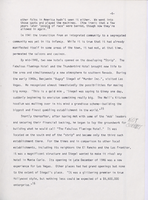Search the Special Collections and Archives Portal
Search Results
Fountain, Ernest M., 1954-
Ernest M. Fountain was born in Tallulah, Louisiana. After finishing his bachelor's degree in business administration, Fountain moved to Las Vegas, Nevada to study banking and finance. He began his banking career in 1976 when he started working for Valley Bank of Nevada. At the time, he was one of only two black lending officers in the state of Nevada. He is the former Director of the Las Vegas Minority Business Development Center, and is also the founder and past president of the Black Business Council of Nevada, formed in 1991.
Person
Duncan, Ruby, 1932-
Ruby Duncan was born in Tallulah, Louisiana on June 7, 1932. Her parents passed away when Duncan was three years old and she spent the remainder of her youth living with various relatives in and around Tallulah. Duncan started work at the Ivory Plantation at an early age, only going to school part-time. She quit school to work full-time as a waitress and later a barmaid. Duncan left Tallulah for Las Vegas, Nevada in 1952 to live with her aunt near Henderson, Nevada.
Person

Black Entertainers in Las Vegas: 1940 - 1960
Date
Description
Essay by Roosevelt Fitzgerald reflecting on black entertainers during the early days of the Las Vegas Strip, dated 1988.
Text
Whaley, Nathaniel, 1934-
Nathaniel Whaley was born on July 01, 1934 in Tallulah, Louisiana. He moved to Las Vegas, Nevada in 1943. He married his wife Eva, in 1984. Before leaving high school to provide for his new wife and son, Nathaniel had a successful high school career as an accomplished athlete and Eagle Scout in the first black Boy Scout troop in the area. Nathaniel would go on to have a fruitful career as a mason and contractor, literally helping build the city of Las Vegas. His jobs included the Dunes, the Sands, Union Plaza and the Maxim Hotel.
Person

James A. Gay III interview, 1973: transcript
Date
Archival Collection
Description
Interview with James A. Gay III conducted by Joyce M. Wright in 1973. Edited by Elizabeth Nelson Patrick, and transcribed for the project "Black Experience in Southern Nevada, Donated Tapes Collection," James R. Dickinson Library, University of Nevada, Las Vegas, December 1978. Arriving in 1946 from Fordyce, Arkansas, Gay became the first African-American mortician in Las Vegas. He later worked as Assistant Manager of the Sands Hotel and Casino and Union Plaza while serving as an executive board member of the Culinary Union. Instrumental in the Las Vegas community, Gay worked to improved race relations, addressing social, economic, and civic issues. Gay was awarded an honorary degree from the University of Nevada, Las Vegas in 1988.
Text
Duncan, Katherine
Katherine Duncan was born in Ratio, Arkansas. Her parents, who were sharecroppers, and her 11 brothers and sister migrated to Boston in the winter of 1969. She moved to Las Vegas on July 7th, 1977 and started working at the MGM Grand Hotel. She also worked with the Nevada Motion Picture Services, at her own travel agency, and at the Riviera Resort and Casino. She started a black heritage tour of Las Vegas.
Person
Claxton, Eunice, 1942-
Eunice Claxton was born in 1942 in Tallulah, Louisiana. When she was ten years old, she and her mother moved to Las Vegas, Nevada for a few years. She attended the Westside Elementary School in Las Vegas, but she finished her education in Reno, Nevada. She lived in Reno until 1974 when she returned to Las Vegas. Claxton worked in a number of different establishments. She worked as a change girl at the Desert Inn and as a cocktail waitress at the Dunes Hotel. She also worked at clubs such as the Cover and the El Morocco.
Person
Washington, Isadore
Isadore Washington was born in Tallulah, Louisiana, the son of Isadore Washington, Sr., and Destelle Washington. His father came out to Las Vegas, Nevada in the 1930s to work on Hoover Dam, and the family followed in 1942 when Isadore was eight years old. His mother worked at the El Rancho and Last Frontier Hotels, the Shaw Apartments and Harrison boarding house on the Westside where black entertainers were expected to stay. Washington recalls playing with Wayne Newton when they were children and life on the Westside where he attended the Westside School.
Person


